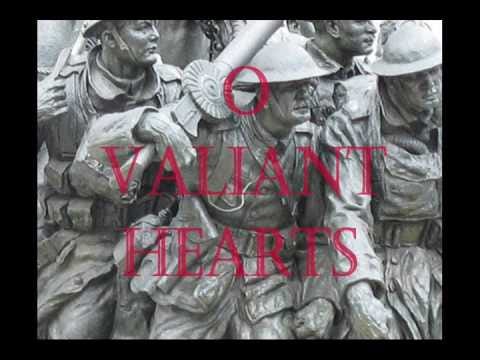I’ve written that a young man can attend almost any Christian church in the United States now, and, with the possible exception of a bowdlerized version of For All the Saints on All Saints’ Day, never once sing a masculine hymn that exhorts us to take up our spiritual arms and fight for Christ. Such hymns have been expunged from most contemporary hymnals. For an idea of the great treasures we have buried in the basement, I submit O Valiant Hearts, an excellent hymn, fit for a Sunday near to Veterans’ Day or Memorial Day, or for the funeral of a soldier:
O valiant hearts, who to your glory came, Through dust of conflict and through battle-flame; Tranquil you lie, your knightly virtue proved, Your memory hallowed in the land you loved. Proudly you gathered, rank on rank, to war, As who had heard God’s message from afar; All you had hoped for, all you had, you gave To save mankind – yourself you scorned to save. Splendid you passed, the great surrender made, Into the light that never more shall fade; Deep your contentment in that blest abode, Who wait the last clear trumpet call of God. Long years ago, as earth lay dark and still, Rose a loud cry upon a lonely hill, While in the frailty of our human clay, Christ our Redeemer passed the self-same way. Still stands his cross from that dread hour to this, Like some bright star above the dark abyss; Still, through the veil, the victor’s pitying eyes Look down to bless our lesser Calvaries. These were his servants; in his steps they trod, Following through death the martyred Son of God: Victor he rose; victorious too shall rise They who have drunk his cup of sacrifice. O risen Lord, O Shepherd of our dead, Whose cross has brought them and whose staff has led, In glorious hope their proud and sorrowing land Commits her children to thy gracious hand.
John Arkwright wrote these words in 1919, just after the terrible first World War. We do not have to celebrate war to cherish valor when we see it. The soldiers honored in this hymn “scorned themselves to save,” says the poet. And whatever may be the shifting sentiments of anyone in the midst of battle, for Christian soldiers that is no more than the truth. They heard the call of duty to man and love of country, and they answered that call. Now they await the trump of doom, when the nations of earth shall be no more. For them it will be the last and greatest reveille, the muster of the body from the grave, and their ranks on ranks will join those of the heavenly armies.
The language of spiritual warfare is everywhere to be found in both Testaments, Old and New. The author of this hymn understands that the Christian soldier follows the Captain who has gone before him. Long ago, on that bleak redoubt in Palestine, a cry resounded over the stillness of the dead earth. It was the battle cry of Jesus, the cry of ultimate obedience and of the last drop of blood shed for His enemies. “Father, into Thy hands I commend my spirit,” said He, and with a groan He gave up the ghost. The cry still sounds, Arkwright tells us, because that cross still stands. In the dark confusion of the battlefield, the cross shines out “like some bright star.” Just as the Father looked upon His beloved Son upon the cross, so now the Son looks upon His beloved, as they die upon their “lesser Calvaries” – an unforgettable image.
“O Valiant Hearts” reminds us that Jesus marched before these fallen soldiers, and that they followed in His steps. He was slain as a witness to the truth; they followed Him in that witness, through the no-man’s-land of death. It reminds us that Jesus rose as victor, over whom death shall have no more dominion, and that his followers will rise victorious with Him. “Yea, though I walk through the valley of the shadow of death,” says the Psalmist, “I shall fear no evil, for Thou art with me; Thy rod and Thy staff, they comfort me.” The hymn reveals that the rod of protection is the wood of the cross, and that the Shepherd is a warrior also.
We are compassed round with so great a cloud of heroes. If a hymn such as “O Valiant Hearts” strikes us as unfit for Christian worship, that sadly shows how thoroughly we have torn the sinews out of our expressions of faith. Many a soldier of Christ lies in an unknown grave. Such a hymn should not lie buried in our basements.




You can also sing it to Abide with Me.
Thank you for this. I can’t stop playing this beautiful song.